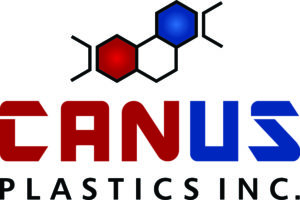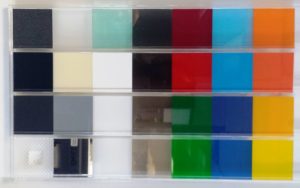Canus carries a wide variety of plastic sheets to suit your needs, based on color, composition, properties, cost and so on. Most sheets come in 4′ x 8′ size and are sold by the square foot also.
Here are some of the sheets we carry:
Acrylic
Acrylics are noted for their exceptional clarity and optical properties. Acrylics are widely used in lighting fixtures because they are slow-burning or even self-extinguishing, and they do not produce harmful smoke or gases in the presence of flame. The most important properties for acrylic (PMMA) are its optical clarity, low UV sensitivity, and overall weather resistance. Acrylic is often used as a glass substitute. We carry acrylic in transparent, translucent and opaque colors, as seen in the picture to the right.
Polycarbonate
Applications of polycarbonate are almost always those which take advantage of its uniquely high impact strength, durability, exceptional clarity and ease of design and formability. These unique properties have resulted in applications such as bulletproof windows, break resistant lenses, compact discs, etc. More recently however, additional interest has resulted because of the low flammability of polycarbonate. This product is offered in general purpose, texture, optical quality, UV resistance, solar control, sign and flame retardant grades. It’s virtually unbreakable strength allows it to be used in a variety of applications ranging from security and vandal protection to storm door and window replacement to do-it-yourself projects around the home. Its versatility allows it both used by both the homeowner and contractor alike. The common colors we carry are clear and a light bronze. We can also source them in black and white.
PVC (PolyvinylChloride)
PVC is hard, brittle and difficult to process, but it becomes flexible when plasticized. Polyvinyl chloride molding compounds can be extruded, injection molded, compression molded and blow molded to form a huge variety of products, either rigid or flexible depending on the amount and type of plasticizers used. Rigid PVC is strong, difficult to burn, has excellent resistance to strong acids and bases, to most other chemicals, and to many organic solvents. Additionally, polyvinyl chloride is one of the least expensive plastics.
CPVC shares most of the features and properties of PVC. It is also readily workable, including machining, welding, and forming. Because of its excellent corrosion resistance at elevated temperatures, CPVC is ideally suited for self-supporting constructions where temperatures up to 200 °F (90 °C) are present. The ability to bend, shape, and weld CPVC enables its use in a wide variety of processes and applications. It exhibits fire-retardant properties.
Polyethylene
PE is by far the largest volume commercial polymer. This thermoplastic is available in a range of flexibilities and other properties depending on the production process, with high density materials (HDPE) being the most rigid. Polyethylene can be formed by a wide variety of thermoplastic processing methods and is particularly useful where moisture resistance and low cost are required. The options we carry are LDPE (low Density Polyethylene), HDPE (High Density Polyethylene) and UHMW (Ultra High Molecular Weight).
ABS
There are many different grades of ABS with a wide range of features and applications. In addition, many blends with other materials such as polyvinylchloride, polycarbonates and polysulfones have been developed. ABS materials can be processed by any of the standard thermoplastic processing methods.
Acetal (Delrin)
The acetal resins are among the strongest and stiffest of all thermoplastics, and are characterized by good fatigue life, low moisture sensitivity, high resistance to solvents and chemicals, and good electrical properties. Because of these properties, acetals often compete with nylons for many of the same applications. Acetals may be processed by conventional injection molding and extrusion techniques. The main area of application for acetal is industrial and mechanical products.
Nylon
Polyamides (Nylon) comprise the largest family of engineering plastics with a very wide range of applications. Nylons are often formed into fibers and are used for monofilaments and yarns. Characteristically, nylons are very resistant to wear and abrasion, have good mechanical properties even at elevated temperatures, have low permeability to gases and have good chemical resistance.
PP (Polypropylene)
Polypropylene properties vary according to molecular weight, method of production, and the copolymers involved. Generally polypropylene has demonstrated certain advantages in improved strength, stiffness and higher temperature capability over polyethylene. Polypropylene has been very successfully applied to the forming of fibers due to its good specific strength which is why it is the single largest use of polypropylene.


